People Before Profit People Before Profit

SPECIAL FEATURE: PREVIEWING Hr NETWORK PEOPLE-FIRST CULTURE CONFERENCE & EXHIBITION 2023 MARCH 2023 VOLUME 19 ISSUE 4 A MEDIA AVENUE PUBLICATION | www.hrnetworkjobs.com Inspiring People Development

2 unique experiences
an experience, like no other
Our newly renovated showroom is open and ready to be rediscovered. We recently embarked on an incredible transformation to create a space that celebrates heritage whilst innovating with contemporary design.

hamiltonandinches.com
COVER STORY
People Before Profit: Embedding a people-first culture
Embracing a People First Culture might seem a given for many HR practitioners. But how far do your practices go? Are your policies genuine or more lip service? Andy Moore discovers the importance and the benefits of putting people before profit.

16
4
CONTENTS





8 8 News 14 Legal Bites A range of updates from the world of employment law 20 Stats Employees report increase in suicidal thoughts 22 Feature Two Preview of categories and criteria for the Hr NETWORK National Awards 2023 32 The Bookshop Latest bestsellers to the published 30 Feature Three Preview of the ‘PeopleFirst Culture’ Conference & Exhibition 2023 34 Feature Four Dealing with BurnoutRecognising when it gets too much 38 Extra Transforming Employee Management – Wellbeing and motivation in a hybrid world 42 Insights Outplacement; Diversity & Inclusion; Employee Engagement 46 My LinkedIn John Ferguson 38 42 22 34 CONTENTS 5
Martin Preston Delamere Private Rehab Clinic
Feature Four: Dealing With Burnout –Recognising when it gets too much p. 34
Dave Page
Actual Experience
EXTRA: Transforming Employee Management – Wellbeing and motivation in a hybrid world p. 38
Natalie Camp Profusion
Insight: Equality MUST start in the classroom p. 42
Jim Hogsflesh Right Management
Insight: Outplacement is more than just finding a job p. 43
Kathy Abernethy Peppy
Insight: LGBTQ+ employees are best supported when benefits are fully inclusive p. 44
Dominic Fitch Impact International
Insight: Keeping your employees motivated during challenging times p. 45
Founder and Publisher: Lee Turner lee@hrnetworkscotland.co.uk
Senior Associate Editor: Andy Moore editor@hrnetworkscotland.co.uk




Deputy-Editor: Teresa Flannigan editor@hrnetworkscotland.co.uk


Editor-At-large: Neil Archibald editor@hrnetworkscotland.co.uk
Editor’s Assistant/Admin: Marion Robertson editor@hrnetworkscotland.co.uk
Advertising/Sponsorship: Donna Turner advertising@hrnetworkscotland.co.uk
Design: Media Avenue Ltd
Hr NETWORK now available on:
LinkedIn: uk.linkedin.com/in/ hrnetwork1
Twitter: www.twitter.com/ HrNETWORKNews
YouTube: www.youtube.com/ user/hrnetworkscotland
Media Avenue Limited
18 Young Street, Edinburgh, EH2 4JB 0131 625 3267
www.hrnetworkjobs.com
www.mediaavenue.co.uk
The views expressed in Hr NETWORK (SCOTLAND) are those of invited contributors and not necessarily those of Media Avenue Ltd. Media Avenue Ltd does not endorse any goods or services advertised, or any claims or representations made in any advertisement in Hr NETWORK (SCOTLAND) magazine and accepts no liability to any person for loss or damage suffered as a consequence of their responding to, or placing reliance upon any claim or representation made in any advertisement appearing in Hr NETWORK (SCOTLAND)magazine. Readers should make appropriate enquiries and satisfy themselves before responding to any such advertisement or placing reliance upon any such claim or representation. By so responding or placing reliance readers accept that they do so at their own risk. © Media Avenue Ltd. 2023.
6 CONTRIBUTORS
March 2023
A very warm welcome to our March 2023 online issue of Hr NETWORK magazine and we’re very excited about a wide range of activities and plans we have for this year.
As ever, there are hugely exciting plans for the forthcoming Hr NETWORK Conference, Exhibition & Leaders Dinner taking place at the magnificent BT Murrayfield Stadium in Edinburgh on Thursday 11th May followed by the Hr NETWORK National Awards Gala Dinner which takes place at the hugely impressive Hilton Glasgow on 9th November.
We will also have a number of smaller, more intimate events, including Webinars with some of our partners, Hr40 Dinners and the Annual Nominees Lunch later in the year.
Last years’ decision to move the Conference & Exhibition to BT Murrayfield has created a significant new level of interest and our ‘People-First Culture’ themed
gathering will once again take place at the home of Scottish Rugby on Thursday 11th May, featuring an impressive group of award winning organisations and speakers who have realised the huge benefits for their organisation, when putting people before profit.
Our Conference Planning Team is currently pulling everything together to make this our biggest and best Conference yet and aim to make people feel connected and inspired and by attending, can enjoy the great benefits that come from the many networking opportunities too.
Hr NETWORK Awards Gala Dinner 2023
We are very excited to open the Nominations for this years’ Hr NETWORK National Awards and the prospect of hosting the 16th Awards Gala Dinner again in November. We are extremely grateful to all our sponsors and table hosts for their wonderful and continued support again this year and if you would like to join us at the Gala Dinner with your guests, please contact the Awards Planning Team as soon as possible.
This Issue
Embracing a People First Culture might seem a given for many HR practitioners. But how far do your practices go? Are your policies genuine or just more lip service? Andy Moore discovers the importance and the benefits of putting people before profit.
The regular sections of the magazine include: Stats, the Bookshop and a range of Insight features on some hot topics in the people management & development world.
I hope you enjoy your online copy of Hr NETWORK Magazine and look forward to welcoming you at our events this year.
Lee Turner Publisher
Contributors: Martin Preston, Dave Page, Natalie Camp, Jim Hogsflesh, Kathy Abernethy, Dominic Fitch.

7
WELCOME
Violence and harassment at work ‘almost always a pattern’, study finds
Violence and harassment in the British workplace is rife, after a global safety charity report found that 26% of people have experienced it in their working lifetime – above the global average of 21%.
The new report, Safe at Work? Global experiences of violence and harassment, based on Lloyd’s Register Foundation’s World Risk Poll, powered by Gallup, also found that 58% of British respondents who have experienced workplace violence and harassment say this has happened three or more times.
While the report suggests that men are fractionally more likely to report having experienced violence and harassment at work at a global level (22% vs 20% of women), the most vulnerable sub-groups, as identified by the report, are mostly comprised of women.
For example, women with a tertiary education were found to be second most at risk globally, with 29% (or
Workers unwilling to wait until payday to access wages
With the cost of living crisis taking full effect, reports from Nationwide reveal that cash withdrawals increased by 19% in 2022 as people attempted to better manage their personal finances. In contrast, Government data suggests that ATM numbers have declined consistently year on year since 2015 meaning that this is an unsustainable approach to money management. Expert in global pay solutions, CloudPay, warns that access to wages both instantly and digitally is required now more than ever and that a more forward-thinking approach to wage access is a clear need of the workforce.

Paul Bartlett, CEO at CloudPay comments: “It’s no secret that families and businesses across the UK are feeling the full effects of the rising costs of living as it continues to have a deep impact on people’s lives. In this environment, we are encouraged to see people looking at ways they can better control their finances. While the use of physical ATMs has clearly increased, there is a huge opportunity for businesses to support their workers during this time of uncertainty with flexible access to their earned wages via a ‘digital ATM’.
36% in the UK) reporting experiences of violence and harassment at work. In comparison, 15% of women with primary education only (25% in the UK) reported the same experiences, highlighting a gap between education levels.
Globally, those already affected by discrimination outside of work – for instance gender, ethnicity or disabilitybased – are twice as likely to experience violence and harassment in the workplace (39% compared to 16%). In the UK, 48% of those who had experienced discrimination on the basis of gender had faced violence and harassment at work.
Suzanne Maybud, an international consultant on gender equality and women’s advancement in the workplace, commented: “While many are aware of violence and harassment in the workplace, the country-specific figures, provided by Lloyd’s Register Foundation, are especially valuable to showcase just how widespread it can be in any given location – and who’s most at risk.”
“Pre-Covid, flexibility in the workplace wasn’t as common and the traditional payroll structure of monthly pay wasn’t questioned. Today, the workforce is waking up to the realisation that they are owed money by their employer and are becoming less willing to wait to be paid as a result. This sentiment will only snowball in the coming months. And with hiring difficulties still being reported across a number of sectors, businesses will struggle to both attract and retain the talent they need due to inflexibility around payment options.
“There’s a growing feeling across the workforce that people should be able to access the salary they have already earned when they want and need it, rather than wait until a designated pay day - or resort to loans or credit cards. We have found that employees that have access to our Pay On-Demand solution, CloudPay NOW, typically make four small withdrawals throughout the pay cycle when unexpected costs arise.
NEWS
8
1 in 3 UK workers suffer moderate to severe anxiety or depression

New figures from leading mental health app Wysa show that the UK mental health crisis is worse than estimated in working people. Over 1 in 3 (35%) working people suffer moderate to severe depression or severe anxiety – three times higher than the estimated UK adult prevalence.
Official figures point to 1 in 6 of us struggling with mental health, up from 1 in 10 prior to the coronavirus pandemic. According to the latest research from Wysa, 11.3 million adults should be getting some kind of therapy or support for moderate to severe anxiety or depression. The latest Health & Safety Executive report points to 914,000 workers suffering from work-related stress, depression or anxiety in 2021/22 - but this research suggests a much greater issue.
The rate of moderate to severe anxiety or depression is higher amongst younger people – nearly half (44%) under 24 are demonstrating symptoms of moderate to severe anxiety, compared to 27% over 54. The same pattern is seen when it comes to depression. Twice as many under 24s show scores suggesting moderate to severe depression as those over 55 (46% vs 21%). Overwork, the challenges of the economy, and difficulties affording rent or houses are all taking a toll on the next generation.
These findings correlate with the recent Institute of Fiscal Studies report that stated the number of working age new disability benefit claimants has doubled in the past year. Around a third of new claims were for mental health conditions. Among claimants under 25, that figure rose to 70%.
Worryingly, half (52%) of people using Wysa who screened as suffering symptoms of moderate to severe depression or anxiety, at levels requiring further investigation and treatment, have not spoken to a healthcare professional. The primary reason is that they don’t think their symptoms are serious enough.
Women, in particular, play down their symptoms. Almost half (48%) of women who experience symptoms of moderate to severe depression or anxiety have not spoken to a professional because they don’t think it’s serious enough, versus men 1 in 3 (33%) who think the same. Or they worry a health professional won’t think it’s serious enough – 21% said this was a worry.
Stigma prevails in men, and there is a clear gender divide. 1 in 3 men (31%) who need help have not sought it because they report being too embarrassed, compared to a quarter of females (25%). A quarter take time off work citing physical health and 22% take annual leave, fearful of giving the real reason.
NEWS
T: 0141 221 2984 E: enquiries@fdpeople.co.uk www.fdpeople.co.uk Get in touch HR & Employment Law Health & Safety Payroll Expert Tailored Support in Contact us for a FREE no obligation consultation. 9
Learning & Development can increase top line revenue by 218%
ILX’s Group’s new research reveals that upskilling through learning and development could be the answer to business’ concerns around diminishing revenue and stagflation.
The evidence is clear, companies that align learning with the organisation’s objectives and invest in relevant skills will see improved productivity. We have seen this before, following the Dot Com bubble and the 2008 financial crisis – as the economy slows, businesses cut costs, and often there are job losses. But for the employees that remain, improved productivity is the goal; and investing in learning programmes that support the organisation’s strategy is often the key to unlocking employee productivity.
‘Even businesses that over expanded during the boom times are likely to invest in training for staff that they retain – says ILX Managing Director Russell Kenrick. Fund managers and investors are Bearish as the market navigates its way through stagflation, with the ONS reporting a 9.6% increase in inflation on the all-item CPIH annual rate. Macroeconomic and geopolitical
factors have put an end to a 127-month Bull Run, with the tech sector being hit particularly hard.
Experts at ILX argue that developing the skillsets of existing workforces is the best way to safeguard businesses in this challenging macroeconomic environment. At a time when cost-saving innovations are necessary, skilled workers are required to implement them. And rather than absorbing the costs of a new hire, investing in existing workforces can both enable businesses to be agile in response to a turbulent financial environment, and help improve employee retention.
Analysis shows a strong correlation between L&D and company profitability. On average, the investment into L&D is £42bn each year in the U.K. alone, with an average spend of £1530. Companies that invest in L&D have a 24% higher profit margin than those that spend less on training, according to the Association of Talent Development, and those with comprehensive training programs also have a 218% higher income per employee. The Great Resignation is hitting companies harder than expected with the average cost of replacing an individual employee ranging from one-half to two times the employee’s annual salary. ILX’s independent research reveals a cost of £31,375 for leadership replacement and £14,117 employees at management level. These numbers do not factor in training and on-boarding, nor do they reflect the time spent learning company processes, tools, and protocols.
A new study reveals majority of workers do not receive any training at work
Around 66% of office workers in the UK don’t feel they’re given enough opportunities to progress in their current position. 1 in 4 (27%) office workers would also leave their current position if offered better opportunities for progression elsewhere, such as salary or seniority, a new nationwide survey reveals
The Lunch and Learn Survey, from Just Eat for Business, asked the nation’s employees about their career outlook and aspirations, including how many opportunities for progression they’ve been given in their current role, and how they feel about job satisfaction overall.
For a quarter of those surveyed, a role that offered a better salary, increased responsibilities or a more advanced position would turn their head, as progression is a priority for them.
This is unsurprising given that for many employees, the pandemic highlighted the aspects of their working life that they’d like to improve, including work-life balance, salary, position, commuting time, personal development and career outlook, to name a few.
For those who would leave their current position, the most tempting factor came out as a better salary (29%), as well as improved work-life balance (24%) and more seniority (16%).
Salary is a key sticking point for many, with the survey also revealing that almost a third (29%) feel their wage isn’t representative of their skill level, and that they’re undervalued.
Not only is career progression beneficial when it comes to salary or seniority - it’s also linked to greater job satisfaction, boosted productivity, heightened drive and increased confidence.
As well as improving individual career outlook, progression and fostering opportunities for growth can benefit a company on the whole, as employees are more motivated to excel when clear incentives are available, and when career advancement is at the forefront.
Other results detailed in the survey include whether workers feel supported by their partner or employer when it comes to progression, and what type of training they most often receive.
NEWS
10
More women taking flight and joining the aviation industry
In 2021, female pilots made up around 64,979 of total FAA-certified pilots, accounting for only 9%, a recent survey showed. Professions like mechanics, maintenance crew member, or flight engineers are not breaching 10% as well. While women still remain a minority in the industry, there has been a slow but steady increase of female aviation professionals
Compared to 2017, there has been a 52% increase in women pilots – from 42,694 to 64,979 – and a 20% increase in mechanics – from 6,855 to 8,231. Some even predict that in the near future, one in four pilots will be a woman behind the yoke.
“Unfortunately, the road for women in piloting, aviation mechanics or engineering is still a rocky one,” explains Alison Dsouza, Director of Aerviva Aviation Consultancy, a Dubai-based international consultancy, specialising in aviation recruitment and document management.
“A positive is that while there were no drastic changes in the past 10 years or so, there is a notable increase in women aviation professionals overall. In recent years women became more assertive in terms of pursuing their dream career paths in aviation. This is mostly reflected by the growing number of female pilots across the age groups.”
According to a recent survey, India has taken the spot of the leading country when it comes to female pilots worldwide, with roughly 12.4% – twice the global average. Comparatively, in Ireland just 9.9% pilots are female, whilst in UK only 4.7%.
There is no such thing as a male or female profession, so inspiring both young and old is important. And these slow and steady numbers are, too, changing the game – one step at a time.”


Not only airlines, but training organisations are taking action in shining light on the still-small numbers of women in aviation. Several scholarship programs have been initiated that offer fully funded training for a select number of recipients.
While the progress could have a quicker pace, the steadily increasing numbers and stories of women in aviation give hope that bringing more attention on these role models will encourage more women to pursue a career in aviation – be it a pilot, a mechanic, or a ground handler.
NEWS
been no shortcut to this point, but you did it! Your new job is a reality. Your thoughts now turn to how you make the right impact from day one.
First 90-Day Roadmap™ allows you to manage your entry into a new role. It provides a structure that will help you get started, enhance your chances of success and saves you time. Visit www.befutureready.today and find it in Roadmaps. Your First Roadmap™ 90 Days 11
There’s
Your
ESG measures in UK executive incentive plans gaining momentum
More UK public companies are incorporating Environmental, Social and Governance (ESG) measures in their executive compensation programmes, according to a new study by WTW (NASDAQ: WTW), a leading global advisory, broking and solutions company.
Since the previous year, the use of ESG metrics in UK executive incentive plans has grown to 89%, up from 81% as pressures to improve disclosure transparency grows.
Growth is occurring in both short-term and long-term incentive plans in the UK. According to the study, 85% of UK companies tied their short-term incentive plans to at least one ESG measure, up from 79% the previous year, while the number of companies that used at least one ESG measure in their long-term incentive plan rose from 24% to 37% in the last year.
Looking more broadly across Europe, the most prevalent measures companies are using in incentives plans are social metrics (79%). Social measures incorporate multiple categories including HR and people, inclusion and diversity, and employee health and safety. Three quarters of European companies (75%) include Human Capital measurements in their incentive plans. Almost two-thirds (65%) incorporate environmental measures that address areas such as climate change, carbon emission reduction, and responsible use of natural resources. The use of almost all of these measures increased over the previous year.
“Pressure from institutional investors, proxy advisors, employees and other market stakeholders is reshaping the envelope,” said Richard Belfield, WTW. “Companies are beginning to focus on a stronger link between their executive compensation plans and ESG priorities, particularly with respect to climate change and environmental measures, inclusion and diversity matters, and overall human capital governance. And we expect this trend to continue if not accelerate in the next few years.”
“Advances in climate transition such as carbon emission reduction will be a main area of development globally. Leading global companies are monitoring developments across different regions and adapting their programs accordingly.”
Jaguar Land Rover announces record number of degree apprenticeships
Jaguar Land Rover has recently announced a record number of degree apprenticeships are on offer this year, opening up opportunities to gain a degree in a world class automotive business and develop the next generation of modern luxury vehicles, without accruing large debts.

As the UK-based modern luxury car manufacturer opens 300 places on its 2023 apprenticeship scheme, it is announcing 150 of those will be degree apprenticeships - a 70% increase on last year - to deepen its talent pool with digital, autonomous and electrified skills. Degree apprenticeships offer those who might not consider university due to the cost, the opportunity to get started in the industry and get paid by their employer while they also study.
The JLR starting salary of circa £24,500 is well above market rate meaning young people can afford to move closer to JLR for a degree apprenticeship.
JLR Head of Early Years Careers Programme, Anne Marie Campion said: “Our apprenticeship programmes including our Degree Apprenticeships are highly sought after. Our apprentices will enjoy a fantastic experience.
They will learn with the UK’s top training providers and support our Reimagine strategy, working on our future vehicles that are fundamental to our global success.”
Last year JLR launched its Future Skills Programme, a global up-skilling that will see 29,000 people trained in electrification and digital skills in the next three years.
These skills are essential to developing, building and delivering JLR’s next generation of cars that epitomise modern luxury experience for clients.
NEWS
12
FNZ appoints Group Chief People Officer to further strengthen its global leadership team
FNZ, the leading global wealth management platform, has bolstered its global leadership team with the appointment of Renata Mrazova as Group Chief People Officer, based in Prague. In her new role, she will be focussed on developing FNZ’s long-term people strategy, ensuring that the company continues to build the structure, talent and capabilities needed as it accelerates its mission of opening up wealth.
Renata joins FNZ with an impressive track record, developed throughout an extensive career in senior leadership roles across the global financial sector. Renata joined FNZ from her most recent role as Group Chief People Officer at the leading consumer finance provider, Home Credit International, where she successfully implemented a range of people management improvements around compensation, evaluation, HR digitization, learning and development.
Her career transitioned into people management when she was promoted from NN’s CEO for the Czech and Slovak Republic to NN’s Global Head of HR. Prior to this, she has held various senior positions that provided her with unique business knowledge, including CFO and CEO at ING Group for the Czech and Slovak Republic, CEO at Direct Pojistovna, as well as CFO at Astra, where she coordinated the merger with British Zeneca.
Among others, she was awarded the Stanton Chase Diversity Award in 2019 for her outstanding contribution to Diversity and Inclusion. Renata Mrazova, FNZ Group Chief People Officer, said: “I am thrilled to be joining the company at this point in its journey. We have a very exciting people, culture, and transformation agenda ahead of us, and I’m looking forward to the new challenge, contributing to FNZ’s future growth and making an impact.”
Adrian Durham, FNZ Group CEO, added: “I am delighted to welcome Renata to FNZ. She’s a hugely respected HR leader with extensive experience and, with her depth of business and financial market knowledge, is perfectly positioned to support FNZ as we work together to deliver ever greater value to our colleagues and customers around the world as we continue our mission of opening up wealth.”
Agilis Health’s comprehensive suite of occupational health services cover the complete spectrum of work-related health issues, including:

• Prevention and control measures
• Travel health and wellbeing
• Health surveillance
• Immunisations
• Health risk assessments
• Recommendations on treatment
• Legal support
agilishealth.co.uk/occupational-health
NEWS
occupational health support they deserve.
Keep your employees healthy and safe.
We support companies to thrive, by looking after your people’s safety, physical health, and mental wellbeing.
13
Legal Bites Legal Bites
Legal Bites is our regular bite-size employment law updates and tips for employers and employees

Women bear burden of stopping misogyny in the workplace
By Rachel Phillips, Employment Solicitor at JMW Solicitors
Following some recent high-profile reports of misogyny in the workplace, whilst some may look at their workplace and believe there is no such problem, countless women are still feeling the pressure to alter their behaviour and avoid unwanted attention and comments at work.
Individual women bear the heavy burden of trying to stop misogyny in the workplace, often at great personal and professional risk to themselves, by adjusting their own behaviours, leaving jobs, or engaging with reporting and investigating systems that do not suit their needs.
LEGAL BITES 14
Rachel’s guidance for employees and employers
For Employees:
• If employees do feel they are suffering sexist treatment, a first step is to raise issues informally with a supervisor or HR colleague. If a more formal avenue is required, employees should follow their employer’s grievance procedure. Employees will only have the confidence to speak up and raise issues to HR if they feel safe and supported in the workplace. Importantly, women should not have to adjust their behaviour to address misogynistic and sexist behaviour.
• It is also important to add that transgender and non-binary employees also face high levels of discrimination within the workplace.
• Misogynistic and sexist behaviour can have detrimental effects for an employer.

For Employers
• Employers need to be careful to assess their workplace policies, dress codes, gender pay gaps, promotional patterns as well as their overall culture.
• Employers can help by having clear company policies on required standards of behaviour (including anti-harassment and bullying policies), staff training to handle complaints, allowing flexible working, having family friendly policies, avoiding role stereotyping, closing the gender pay gap, promoting a respectful and inclusive culture and importantly engaging men in the conversation. Practical and meaningful steps need to be taken to identify and eliminate all forms of everyday sexism.
Almost a 10% increase to the National Living Wage
 By FD People
By FD People
As the cost of living is at the forefront of everyone’s mind, the National Living Wage will increase in April 2023. This increase comes as a much-welcomed change for employees. The increase for 2023 will go up by 9.7% or 92p to £10.42 per hour for people aged 23 and over. This represents an annual pay rise worth over £1,600 to full-time workers. The 9.7% increase is reflected in all other national minimum wage rates apart from 21-22 age rates, which will increase by 10.9%. These changes will take effect in April 2023.
This increase has been commended by the Living Wage foundation as a benefit for the whole country, not just employees, with the Director of the foundation stating ‘employees earning a decent wage are likely to be more productive and able to spend in their local economies.’ This increase also reduces the gap between the National Living and the Voluntary Real Living wage, and could encourage more employers to become accredited Real Living Wage Employers. The increase, although a much-needed boost for low-paid workers is yet another increase in costs for employers. Whilst no one could argue that employees need the rise to meet increasing costs, it may mean that employers are having to review their headcount and their hiring plans in 2023. Again, we would be happy to chat with any employer with concerns about what 2023 has in store for them and look at ways we could support you to move forward.
LEGAL BITES 15
“Individual women bear the heavy burden of trying to stop misogyny in the workplace, often at great personal and professional risk to themselves.”
People Before Profit: People Before Profit:
Embracing a People First Culture might seem a given for many HR practitioners. But how far do your practices go? Are your policies genuine or more lip service? Andy Moore discovers the importance and the benefits of putting people before profit.

16
FEATURE

FEATURE
For Scottish HR practitioners, it’s all very well having knowledge of people polices; the true measure of a caring employer is putting people at the heart of them.
Today’s new employee landscape and expectations are characterised by the post Covid world of work, a candidate-driven market and the cost of living crisis. This is placing increasing emphasis on employees working for organisations who treat them fairly, provide equality and opportunity for career growth, together with recognition and reward, beyond pay.
A report by Appreciate Business Services revealed that 52% of 2000 respondents believe their productivity increases when they feel valued by their employer.
Frank Creighton, Director of Business Development at Appreciate, says: “The fact that one-third of staff feel undervalued should be a massive wake-up call for UK businesses, particularly in light of the report. This found almost half (49%) of people would feel a heightened sense of loyalty to their employer if they felt valued by them.”
So how does Scottish HR deliver people-first policies? It starts with a strong set of employer values, the cornerstone of all people practices. And these values must reflect an organisation’s DNA, from prioritising people engagement, wellbeing and career development – right through to training and reward.
Sincere values that are followed through create a workplace culture where employees know they are appreciated. Glassdoor’s five-country study listed ‘Culture and Values’ as the top factor in workplace satisfaction in the UK, part of a huge shift, it predicts will contribute to people-first HR practices this decade. Putting people first also depends greatly on HR listening very closely to its employees and then delivering responsive practices, matched by effective communication.
Listening attentively to colleague’s needs has never been more imperative given the UK-wide strikes in recent months. The NHS, the teaching profession, council workers, transport colleagues and the Royal Mail are some of the occupations that have held protests for fairer remuneration and work conditions.
Tony Guadagni, Senior Principal in the Gartner HR practice, says: “Employees’ sensitivity to perceived pay gaps is being exacerbated by today’s economic
conditions, including rising inflation and the hot labour market. This is causing a shift in compensation between tenured employees and new hires.”
Gartner reveals that most actions that create pay equity issues occur outside of the HR function, and are the result of manager decisions. Most pay gaps arise from decisions surrounding hiring, promotion and performance assessment.

To effectively address and sustain pay equity across the organisation, HR leaders must broaden the scope of accountability for pay equity when making critical staffing and compensation decisions, he advises.
“HR leaders need to equip managers with tools that will enable them to make equitable pay decisions and remain responsive to the other demands on the business,” adds Tony.
“When organisations educate employees about how pay is determined, employee trust in the organisation increases by 10% and pay equity perceptions increase by 11%.”
People-first practices must take priority across all ages, genders, races, religion and abilities, matched by equality of opportunity and representation.
And while HR policies have some way to go in achieving these objectives, Scotland has a lower pay gap than the rest of the UK, although parity is a long way off.
“Nobody cares how much you know, until they know how much you care.” So proclaimed the late American president, Theodore Roosevelt.
FEATURE 18
Data from the Office for National Statistics shows the gender pay gap for all employees in Scotland 2022 was 12.2% lower than the UK-wide figure of 14.9%. As the world observes International Women’s Day this March, this is an encouraging development.
For Scottish HR, putting people policies at the top of the tree of course goes beyond pay and equality. The global shift towards flexible or hybrid working was given a boost following new proposals announced in December.
Under new government plans, employees will be able to request flexible working from day one of their employment to make flexible working the default. Flexible working encompasses much more than working from home and in the office – it can be job-sharing, flexitime and working compressed, annualised or staggered hours.

“Giving staff more say over their working pattern makes for more content employees and more productive businesses,” says Kevin Hollinrake, Minister for Small Business.
The new measures are intended to give employees greater access to flexibility over where, when and how they work. Flexible working has been found to help employees balance their work and home life, especially in supporting those who have commitments or responsibilities such as caring for children or vulnerable people.

Such is the importance of promoting a people-first culture across the sectors, Hr NETWORK Magazine will host its national conference & exhibition in May on this theme which features a range of speakers and partners who have successfully implemented a successful people- first culture strategy with many reporting significant business outcomes from putting their people before profits.
Ultimately, a People First Culture must thrive in today’s tough market conditions, but also cope with future challenges in the modern world of work. As Roosevelt pondered: Do your colleagues know how much you care?
People First True Colours
• A true measure is putting people at the heart of policies
• Provide opportunity for career growth; recognition and reward beyond pay
• Employer values are the cornerstone of all people policies
• HR must listen very closely to its employees, matched by effective communication
• People-first practices must address all ages, genders, races, religion and abilities
• Putting people at the top of the agenda goes beyond pay and equality
FEATURE
“Giving staff more say over their working pattern makes for more content employees and more productive businesses.”
19
Kevin Hollinrake, Minister for Small Business.
Employees report increase in suicidal thoughts, reveals new workplace wellbeing report from Champion Health
A study of 4,170 employees has revealed that the amount of professionals experiencing moderate to high levels of stress has increased, affecting 76% of our workforce, a year-on-year increase of 13%. Worryingly, workers experiencing suicidal thoughts has also increased from 8% to 9%.
Data released recently by global workplace wellbeing provider Champion Health gives an insight into the health and wellbeing of the working population between January 2022 and October 2022.
Financial worries are reported as the leading cause for stress outside of work, cited by 37%, a 23% increase on last year’s report whilst perceived workload features as the highest cause of stress in work (73%).
The data, which has been published in Champion Health’s annual report also revealed that:
• 60% of employees feel anxious with 56% experiencing low mood
• Females are 22% more likely to feel anxious (65% female compared to 53% male)
• Younger workers are most likely to experience anxiety and depression (67% of 16–24-yearolds experience symptoms of anxiety with 61% reporting symptoms of depression and 66% of 25–34-year-olds reporting symptoms of anxiety and 60% claim symptoms of depression)
• Poor mental health negatively affects the performance of 1 in 5 employees

• 81% say that they feel tired and 71% rate their sleep as ‘average’ or ‘worse’
• Over 50% of employees rate their productivity as ‘average’ ‘below average’ or ‘low’ with 61% reporting tiredness impacts productivity
• The survey showed that people feel most energised to work at 10.21am and are least energised at 3.31pm.
In addition, team culture and feeling supported at work positively correlates with mental wellbeing and productivity. Those who report ‘feeling part of a team’ experience greater positive mental wellbeing and feel more productive.
Whilst the findings point to a decline in our workers health, it’s not all doom and gloom as 98% of employees feel motivated to improve their wellbeing. 42% cite they’d like to boost their energy levels, closely followed by 41% reporting they’d like to lose weight. When asked what the barriers are to making health changes, 47% report willpower as the biggest barrier followed by 43% stating they face a lack of time.
Harry Bliss, CEO and co-founder of Champion Health, says that while the findings are worrying there is a positive in the amount of employees reporting they feel motivated to improve their wellbeing and that business leaders have an opportunity to improve workplace culture and support employees to thrive.
Bliss comments: “It’s no surprise that the last few years have been extremely tough on employees, and I’m really concerned about the findings of this report. The fact that workers experiencing suicidal thoughts has increased is terrifying; whilst a 1% increase from last year to 9% may seem low on the face of it, it isn’t, this means that in a workforce of 1,000 staff, 90 will be having thoughts about taking their own lives which could have a devastating impact.
“Leaders need to step up and support their workforce, it is not only the moral thing to do but this research shows poor mental health, stress, and fatigue is increasingly affecting productivity, so it is also within the best interests of businesses.”
20
20 STATS





21 SAVE THE DATE 11th MAY Hr NETWORK Conference & Exhibition 2023 BT Murrayfield Stadium, Edinburgh Plus Hr NETWORK Leaders Dinner 2023 Wednesday 10th May 2023 2023 2023 THURSDAY 11TH MAY 2023

FEATURE
ESG AND LEADING WITH KINDNESS AWARDS ADDED TO LIST OF CATEGORIES FOR 2023
By Teresa Flannigan
Nomination’s for this years Hr NETWORK National Awards 2023 in partnership with Roffey Park Institute have opened, and this is your chance to RECOGNISE, ACKOWLEDGE and REWARD your Scottish HR Stars in 2023.

New Award Categories
Following a huge rise in interest for ESG (Environment, Social & Governance), Hr NETWORK is delighted to announce the brand new ESG Award of the Year, which ensures those organisations and their associated partners who have implemented a highly successful and impactful ESG strategy, get the recognition they deserve.
Also being introduced to the Awards this year is the Leading with Kindness Award of the Year category, which is sponsored by Leading Kind. This Award will recognise, acknowledge and reward an Organisation, Team or Individual who has demonstrated kindness to others in the workplace or in society through empowerment to do go above and beyond and provide an outstanding act of kindness that creates a positive impact for the entire organisation.
Since the return to work from the effects of the pandemic, followed by the cost of living crisis that’s swept across the UK with greater pressures expected on more and more employers, we continue to see an incredible contribution from across the HR and people management & development profession as they support business through these extremely challenging times.
With 18 awards categories, which are FREE to enter, this is your chance to RECOGNISE, ACKOWLEDGE and REWARD your HR champions with the award categories determining the top performing HR people, teams, projects and organisations across the people development and management industry in Scotland and the wider UK.
The ‘Nominations Intention’ scheme captures early interest from those intending to nominate in the various categories, running from 1st March to 31st May 2023, and those planning to submit nominations before the deadline can notify the Awards Planning Team who will provide ongoing updates and relevant information during this period.
Following the incredible success of the Awards and Gala Dinner in November 2022, the search is on for those HR and people professionals, who have gone above and beyond in delivering a first class service to the business.
This years’ awards gala dinner is in extremely high demand and organisations wishing to host a table of 10 are strongly advised to secure their table as soon as possible to avoid disappointment.
Those that do manage to attend as table hosts will see the 2023 winners being announced at the hugely anticipated annual Hr NETWORK Awards Gala Dinner taking place at the hugely impressive Hilton Glasgow on Thursday 9th November 2023.
The awards categories are judged in two sections, People categories and Project categories.
People
These categories focus on individuals (except for the HR Team category). Judges are looking for exceptional individuals who MUST demonstrate that they are at the top in their respective role.
Projects
These categories focus on projects/specific initiatives that have had a measurable impact in the organisation.
23
NATIONAL AWARDS 2023 in partnership with
Award categories and typical nomination summary:
Learning & Development Award of the Year
AVAILABLE TO SPONSOR
Typical Nominees: Nominations will either be on behalf of the whole organisation or can be Trainers/Training Managers. Nominees will be nominated by their HR Directors or Senior Manager who has responsibility for training/organisation development within the organisation.
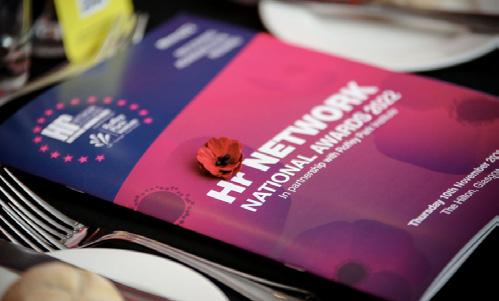
For further information, please visit: www.hrnetworkjobs.com/learning-and-developmentaward-of-the-year
HR Specialist of the Year
AVAILABLE TO SPONSOR
Typical Nominees: Nominees in this category provide leadership and expert advice on discreet areas of HR. The types of role are likely to be middle to senior level HR practitioners that may be, for example, responsible for Equality and Diversity, Health and Safety, Wellbeing, Resourcing, Reward, HR Systems. Nominees will be nominated by their HR Directors or Senior Managers who has responsibility for HR within the organisation.
For further information, please visit: www.hrnetworkjobs.com/HR-Specialist-of-the-year
HR Graduate of the Year
AVAILABLE TO SPONSOR
Typical Nominees: Nominees will typically be early career graduates who graduated in a CIPD (Chartered Institute for Personnel and Development) recognised HRM qualification, on or after the 1st September 2022. Nominees in this category will be nominated by their lecturers or course tutors rather than their employers.
For further information, please visit: www.hrnetworkjobs.com/HR-Graduate-of-the-year
HR Project of the Year
AVAILABLE TO SPONSOR
Typical Nominees: Nominations in this category will either be on behalf of the whole organisation or be individuals or teams who have successfully delivered a significant people focused project with a sustained high level of excellence throughout the projects lifetime. Nominees will be nominated by the Chief Executive or Senior Manager responsible for commissioning the project.
For further information, please visit:
www.hrnetworkjobs.com/hr-project-of-the-year
HR Assistant/HR Officer of the Year
AVAILABLE TO SPONSOR
Typical Nominees: Nominees will be entry-level HR practitioners whose role generally involves providing administrative support within the HR function. They may work in a general administration support function within HR or within a specific HR discipline such as recruitment, learning and development or reward, for example. Nominees at this level may also include HR practitioners who provide advice and guidance to staff and managers within the organisation. Nominees will be nominated by Head of HR or Manager responsible for HR within the organisation - Read more:
For further information, please visit: www.hrnetworkjobs.com/hr-assistantofficer-of-the-year
24 FEATURE
Attraction and Resourcing Award of the Year
sponsored by:
Typical Nominees: Nominations will either be on behalf of the whole organisation or senior managers, in-house resourcing/recruitment specialists or teams responsible for key talent attraction and recruitment initiatives. Such individuals may be part of the HR/OD function or may be part of an in-house recruitment function. Nominees will be nominated by the Head of HR, Executive Director or CEO.
For further information, please visit: www.hrnetworkjobs.com/attraction-resourcing-awardof-the-year

Diversity & Inclusion Award of the Year
sponsored by:
Typical Nominees: Nominations will either be on behalf of the whole organisation or will typically be senior managers or specialists responsible for the overall planning and implementation of a key diversity & inclusion strategy. Such individuals may not necessarily be members of the HR/OD function. Nominees will be nominated by the Chief Executive or Executive Director.
For further information, please visit: www.hrnetworkjobs.com/diversity-and-inclusion-ofthe-year/
HR Business Partner of the Year
sponsored by:
Typical Nominees: Nominees will be senior HR professionals or also HR Business Partners within an organisation who work in partnership with the business to provide specialist strategic, support and influence that enable key clients to effectively deliver their people plans. Provide a service that delivers best practice and commercially focused HR solutions that support the business area in conjunction with specialist HR
functions, bringing people management expertise to business decisions and strategies and secures and/or delivers HR interventions and programmes to achieve business needs. Nominees will be nominated by their HR Directors or Senior Managers who has responsibility for HR within the organisation.
For further information, please visit:
www.hrnetworkjobs.com/HR-business-partner-of-the-year

Employee Engagement Award of the Year

AVAILABLE TO SPONSOR
Typical Nominees: Nominations will either be on behalf of the whole organisation or can typically be senior managers/specialists or teams responsible for the overall planning and implementation of key employee engagement and development initiatives and strategies. Such individuals may not necessarily be members of the HR/OD function.
For further information, please visit:
www.hrnetworkjobs.com/employee-engagementaward-of-the-year
Organisational Development Award of the Year
sponsored by:
Typical Nominees: Nominations may either be on behalf of the whole organisation or may be hired by organisations to undertake this specialist work such as Consultant/Manager/Specialist etc. Nominees in this category can be senior HR leaders or client organisations with regular contact with the individual who have supported the implementation of a programme to improve the organisation’s effectiveness and viability through the introduction of a revised organisational culture allowing the organisation to adapt to new technologies, competition, regulation or other commercial demands.
For further information, please visit:
www.hrnetworkjobs.com/organisational-developmentaward-of-the-year
25 FEATURE
HR Manager/Advisor of the Year
Health & Wellbeing Award of the Year
sponsored by:
Typical Nominees: Nominees in this category run or assist in running the people management functions that support the business. HR Manager/Advisor nominees must demonstrate leadership and direction to enable them to deliver a comprehensive HR service, be that through the HR Team or the Company as a whole. The role may be concerned with the provision of advice, guidance and support to managers in employee relations, discipline, grievance and absence management. Project management may also likely be a feature of the role and may include advice, support and guidance in organisational redesign, redundancy and restructuring programmes. Nominees will be nominated by their HR Directors or Senior Manager who has responsibility for HR within the organisationRead more:
For further information, please visit: www.hrnetworkjobs.com/hr-manageradvisor-of-the-year
NEW AWARD: ESG Award of the Year

Typical Nominees: Nominations will be for the whole organisation. This award will take in to consideration the positive culture and health and wellbeing practices being encouraged in the workplace by one of Scotland’s many positive organisations. The category acknowledge will reward organisations that can demonstrate their commitment to the health and wellbeing of their people through the application of a range of health and wellbeing programmes, which meet the needs of all staff.
For further information, please visit:
www.hrnetworkjobs.com/new-health-and-wellbeingof-the-year-award
HR Team of the Year
The ESG (Environment, Social and Governance) Award recognises those organisations and their associated partners who have implemented a highly successful and impactful ESG strategy. The award also recognises the effective communication surrounding the ESG approach and what employee engagement benefits have been realised by the organisation through its ESG policy. Judges will be looking for organisations to match the rhetoric with real world practice that makes a positive impact.
Typical Nominees: The nomination will normally be the whole organisation. The goal of ESG (Environment, Social and Governance) across the organisation is to embrace responsibility for a company’s actions and encourage a positive impact through its activities on the environment, social inclusion and the accountability of governance in which they operate or have an impact.
For further information, please visit: www.hrnetworkjobs.com/ESG-award-of-the-year/
Typical Nominees: Nominees in this category may be an established HR Team, or alternatively may have come together to form a team to complete a specific project. Nominees will be nominated by their HR Directors or senior Managers who has responsibility for HR within the organisation. Please note that when nominating in this category, a nomination in one of the other categories is also required - Read more:
For further information, please visit:
www.hrnetworkjobs.com/hr-team-of-the-year
Best Employer/Workplace of the Year
sponsored by:

Typical Nominees: Nominations will be for the whole organisation. This award will take in to consideration the positive culture and health and wellbeing practices being encouraged in the workplace by one of Scotland’s many positive organisations. Judges will be looking for empirical evidence such as external accreditations, for example, Living Wage, IIP, BITC, Healthy Working Lives and the like, but also by experiencing the culture and ‘feel’ of the organisation through a site visit.
For further information, please visit:
www.hrnetworkjobs.com/best-workplace-of-the-year
26 FEATURE
AVAILABLE TO SPONSOR AVAILABLE TO SPONSOR AVAILABLE TO SPONSOR
NEW AWARD: Leading With Kindness Award of the Year

sponsored by:
The brand new Leading with Kindness Award for 2023 has been introduced to acknowledge the huge role that kindness and compassion play in our everyday lives. The Award will recognise, acknowledge, and reward an organisation, team or individual that has demonstrated a kinder approach to people, through empathetic leadership, by showing real care and concern for colleagues or customers, and with a positive impact on business performance. Kindness is not the same as being nice. It is acting with intention, standing up for values in tough times and addressing unacceptable behaviour when it is sometimes easier to look the other way. With their actions impacting others through their generosity of kindness, this award will celebrate the unsung heroes that go above and beyond what is required of them in their day-to-day working life.
Typical Nominees: Nominations will be for an individual, team or organisation that has gone above and beyond expectations by demonstrating genuine kindness and compassion towards others or empowering their people through commitment and service for others through their actions. Fostering a culture of kindness and willingness across the organisation to help their community, this award will take into consideration the positive culture and the practice of kindness for others in remarkable examples of kindness across Scotland’s many forward-thinking organisations.
For further information, please visit: www.hrnetworkjobs.com/leading-with-kindnessaward-of-the-year
HR Director of the Year
sponsored by:
Typical Nominees: Nominees will be the most senior HR professional within the organisation operating at or near Board level. They will be responsible for design and execution of an integrated HR strategy or plan. Roles at this level may typically be entitled Head of HR, People Director, Chief People Officer or similar. Nominees will be nominated by their Chief Executive or Chairman of the Board.
For further information, please visit:
www.hrnetworkjobs.com/HR-Director-of-the-year/
Outstanding Contribution to Scottish HR or Lifetime Achievement Award of the Year

The Outstanding Contribution to Scottish HR or The Lifetime Achievement Award is Scottish HR’s most prestigious award specifically given by the Judges to an individual who has an established history of distinguished service to the HR profession either as a practitioner, academic or someone who has successfully transcended different areas of the HR profession. The individual will have made a lasting contribution to HR practice and has demonstrated excellent leadership qualities and provided inspiration to others in the sector. The Award may be presented to an individual in recognition of their contribution to a new innovation, new knowledge, or ways to improve professional practice. Importantly, the contributions should be above and beyond the everyday and have had a long lasting impact in the HR sector.
Please note that nominations for this award are not requested, as the recipient of this award, will be chosen by the Judging Panel.
Nominations
To see the full criteria and to make your nomination, please log on to:
www.hrnetworkjobs.com/events/awards - and select the Awards Nominations Form
If you have any enquiries in relation to nominations, sponsorship or becoming a table host at the Gala Dinner at the Glasgow Hilton on Thursday 9th November 2023, please contact: Tel: 0131 625 3267 or email: awards@hrnetworkscotland.co.uk
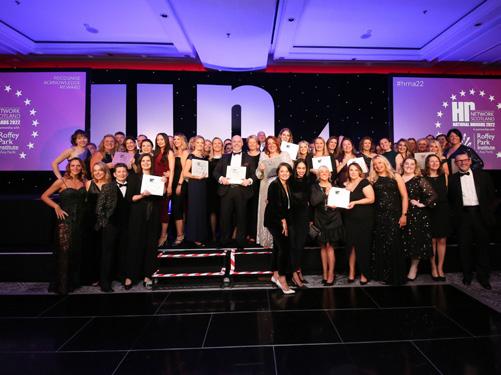
27 FEATURE
BETWEEN the LINES
Follow The Money
By Paul Johnson
Paul Johnson and the enormously respected Institute for Fiscal Studies aim to hold Government to account - without which politicians will get away with their half-truths, elisions and dubious claims. This is a forensic examination - by the man best placed to do so - of the way the state raises and spends £1 trillion of our money every year. To follow the money. To provide an explanation, of where that money comes from and where it goes to, how that has changed and how it needs to change. Johnson looks at what happened following the financial crisis of 2008-09 and the austerity years that followed. He examines the way that the government tackled the economy during Covid - when the UK budget shot up to over a trillion for the first time - and he analyses prospects for our future as we grapple with looming recession and the cost of living crisis.

The Art and Making of Hogwarts Legacy
By Warner Bros
The Art and Making of Hogwarts Legacy takes readers on a journey through the creation of the immersive, open-world action RPG set in the world first introduced in the Harry Potter books and the films. Go beyond the game via exclusive interviews with the development team, stunning concept sketches, renders and illustrations to really explore the creation of this unique take on a beloved world. Includes many neverbefore-seen pieces of beautiful concept art used to craft compelling wizarding world locations from Hogwarts to Hogsmeade, Gringotts and more. Hear from the development team on the process of creating this exciting chapter in the history of the wizarding world.
Get an in-depth look at the compelling characters, detailed environments and amazing magic system that bring Hogwarts Legacy to life. Filled with behind-the-scenes fun facts and information about the gamemaking process, from crafting the setting to developing the gameplay - see the incredible work and talent that go into creating such an immersive gaming experience. This beautiful volume is an ideal collectable for gamers and fans of the wizarding world.

Closer To Love
By Vex King
Do you love your partner but want to rekindle that ‘in love’ feeling?
Do you go on plenty of dates but can’t seem to click with the right person?
Do you keep having the same conflicts with your partner? Vex King, the Sunday Times bestselling author of Good Vibes, Good Life and Healing is the New High is back with Closer to Love, a practical, emotional and spiritual guide to deeper and more fulfilling love. Modern relationships are more complex than ever, but our inherent need to give and receive love is as true today as it ever was. So, how can we find true connections, unconditional love and pure, lasting relationships? In three clear steps, Vex will help you to:
• Understand the role you play within your connections
• Build meaningful and mindful relationships
• Learn how to love authentically and unconditionally

28 FEATURE
BOOKSHOP
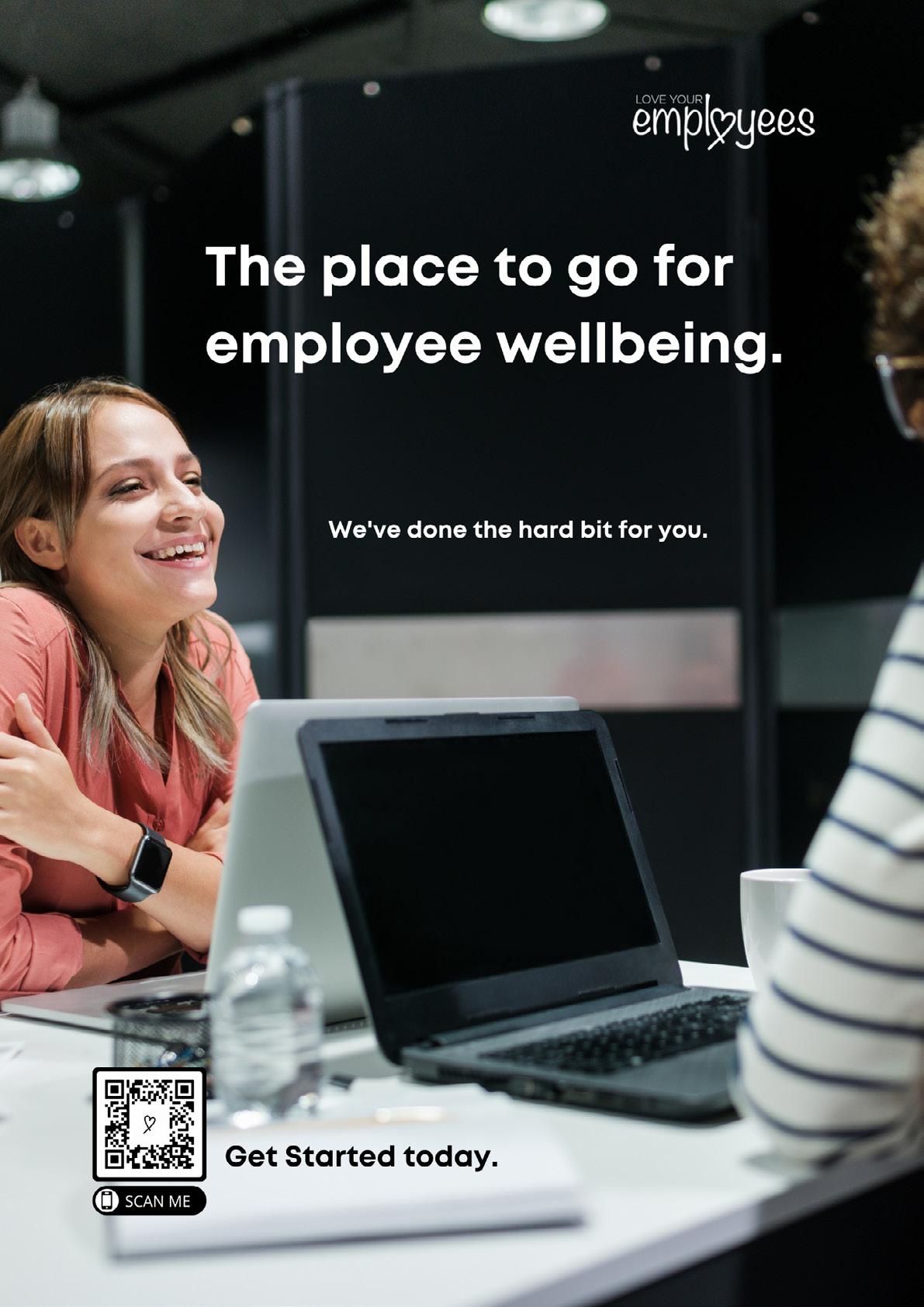
People-first People-first

FEATURE

NETWORK
&
THURSDAY 11TH MAY 2023 BT MURRAYFIELD STADIUM, EDINBURGH
The Hr NETWORK ‘People-First Culture’ Conference and Exhibition 2023 will take place on Thursday 11th May at the magnificent
Murrayfield Stadium
FEATURE
Hr
CONFERENCE
EXHIBITION 2023
People-first culture People-first culture
BT
in Edinburgh.
People-First Culture
The ‘People-First Culture’ theme will consider the difference that organisations can make when they put their people before their profits. Conference delegates will hear from a range of employers who have learned to prioritise the needs and requirements of their employees above all else and will show that a people-first approach boosts engagement, retention, productivity, and creativity.
Speakers from a range of award-winning organisations, who have successfully embedded a people-first approach in their organisation and have created and implemented a sustainable plan, which has not only allowed them to thrive in tough market conditions, but has also ensured that they are able to cope with future threats, including a return to working in a global pandemic, the cost of living crisis, fighting the war for talent and many other threats.
Keynote Speakers
The Conference will feature SIX keynote speakers throughout the day, which also includes a panel discussion and debate. The keynote speakers and panel members will be confirmed very soon. The organisers have provided an insight into the session topics and for a full list of session titles, please visit the Hr NETWORK website delegate booking page, to book your place.
Keynote session topics include:
• Inclusive Leadership: Contributing to psychological safety, organisational performance, and employee engagement.
• Wellness: What part does identity play in burnout prevention and what’s the true cost.

• People Before Profit: Embedding a people-first approach in your organisation.
• Learning & Development: Creating opportunities for all.

• Panel Debate: Creating a case for the four-day working week.

• Recognition & Reward: The power of employee recognition.

Please note that this is a sample of keynote session themes with many other theme’s being featured at the Conference and the full speaker programme will be published on the Hr NETWORK website in due course!
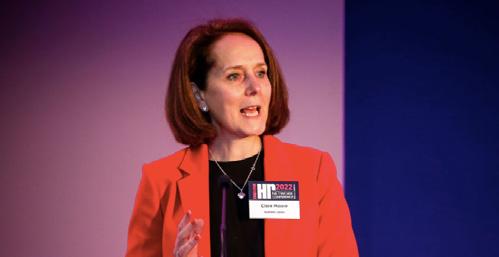
32
The Conference will be hosted by Hr NETWORK associate and trusted advisor Clare Moore, founder of Business Jigsaw.
FEATURE
Keynote Speakers Include:
Fiona Passantino
Sile Walsh
Kelly Swingler
Delegate package includes:
• 6 Keynote Speakers
• Networking & Exhibitor Area
• Lunch & Refreshments

• Delegate Bag and Goodies
• Official Conference Programme
• Delegate List
Full terms & conditions for booking are available on request and the booking form is available at the link: www.hrnetworkjobs.com/events/conference/
Delegate Cost:
£165+VAT
Group booking discounts for groups of 5 delegates or more.
*Please note that the Early Bird booking discount is available until 28th February 2023. From 1st March 2023, the cost per delegate is £165+VAT.

Group bookings available - Details available on request
Please note that costs quoted include full access to the Keynote sessions, Exhibitor area plus lunch and refreshments on the day.
Special Requirements:
Hr NETWORK welcomes a diverse group of delegates to the conference therefore please indicate any special requirements you have on your booking form and we will be very happy to accommodate you while you are attending the Conference.
COVID Safety Policy:
There is no requirement to wear a mask at the Conference. However, any delegates wishing to wear a mask may do so.
For further information on Sponsor and Exhibitor options or to book your Delegate place, please contact the Conference Planning Team on Tel: 0131 625 3267 or email: subscriptions@hrnetworkscotland.co.uk
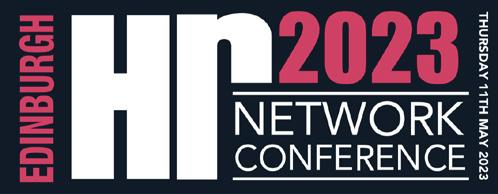
www.hrnetworkjobs.com

33
FEATURE
Dealing

Burnout: FEATURE
Burnout:
Dealing
Dealing with Burnout:

FEATURE Dealing with Burnout: Recognising when it gets too much Recognising when it gets too much
By Martin Preston Founder and Chief Executive at Private Rehab Clinic Delamere.
Following the shock announcement on the 15th February by Nicola Sturgeon to step down as First Minister of Scotland, it’s important to recognise when your job might be getting a bit too much and how you can manage how you are feeling.
After serving in the role since 2014 the leader of the Scottish National Party has said that the decision came as she felt she had less energy to give to the job, and wanted to spend more time with her family.
During her speech, she also noted that leading Scotland through the Covid-19 pandemic and other challenges over the past few years, is one of the toughest things she had to do, with the weight of responsibility having taken its mental and physical toll on her.
The announcement comes after Jacinda Ardern also announced her resignation from her role as Prime Minister of New Zealand last month, citing burnout and also not having ‘enough in the tank’ to do the job justice anymore.
With this in mind, here are five key tips to help you recognise the signs of Burnout.
What are the key signs of burnout in the workplace?
Burnout is recognised in three signs; feeling exhausted, negative feelings about your job role and reduced effectiveness. The key component to preventing burnout is identifying the symptoms as early as possible before the demand becomes too much, leading to depression.
Feeling worn-out is quite normal, but it’s easy to recognise when you or a colleague are beginning to display symptoms of burnout.
1. Feeling exhausted
Employees on the verge of burnout, due to either stress or increased workload, can begin to experience and display emotional and physical signs of exhaustion. People begin to feel a lack of physical energy, but they also develop feelings of being emotionally drained and depleted. A common sign of exhaustion is the lack of motivation to get out of bed in the morning, or day-today work life becomes more challenging than normal.
Over-exhaustion and extreme tiredness can result in sickness among employees. The shortage of energy from burnout can lead to common colds and cases of flu.
2. Feeling sensitive and irritable
Aggressive behaviour is also a common indicator, this could be both within the workplace and outside of office hours. Irritable employees may experience a level of sensitivity and aggression towards their family, friends and colleagues.
While everybody experiences some negative emotions within their job roles, it’s vital to recognise when these feelings are becoming unusual.
3. Feeling unmotivated
Employees may begin to feel more socially withdrawn and find themselves disconnecting within the workplace. This could be recognised as not getting involved with colleague discussions, negative attitude towards work and slipping job performance.
Changes to work motivation can lead to employees having additional days off or turning into work late. This is something employers should look out for before it becomes untenable.

FEATURE
36
While experiencing burnout and mental exhaustion from a highly stressful role are not uncommon, knowing when things get too much can sometimes be hard to recognise.
How can you deal with burnout in the workplace?

Recognising the three key signs are crucial, but there are five strategies and tools you can use to avoid burnout even before you’re burnt out.
1. Finding the root of the problem

Burnout is a response to stress, increased working hours, changes to the work environment and increased workload. But finding where the issue has stemmed from can be beneficial in helping you deal with the situation.
For example, if you are faced with unrealised working hours, it may be that you need to speak to your employer about decreasing your overtime and taking extended annual leave.
2. Ask for help
Getting external advice can give you a different perspective on the situation. Counselling can provide you with a solution to the problem before it develops and help you to discover what is causing the burnout you are experiencing.
If counselling isn’t an option for you, reaching out for help to your friends and family during stressful times can benefit the situation. Your employer may also be able to provide you with the support you need.

3. Eat a balanced diet
Healthy body, healthy mind. Eating the right food, drinking water frequently and keeping a balanced diet is one step in the right direction. Foods are fuelled with natural vitamins and minerals that can give your mind and body a boost.
4. Exercise and keep active
Keeping active and regularly exercising can give you a physical and emotional boost. Take a short stroll during your lunch hour or spend 15-minutes stretching after work. You don’t need to hit the workout machines to feel motivated and enthusiastic, it’s as simple as heading outdoors for some fresh air.
5. Correct your sleeping habits
A lack of sleep or too much sleep can cause exhaustion and fatigue in the workplace, breaking out of this pattern can drastically improve your day-to-day mood and motivation.
Drifting off at bedtime is a challenge for most people all around the world, during this unprecedented time. But there are simple ways you can improve your sleeping habits, try switching your nightly scroll on social media for a relaxing book or cut out coffee before bedtime.
FEATURE 37
TRANSFORMING EMPLOYEE MANAGEMENT,
TRANSFORMING EMPLOYEE MANAGEMENT,
WELLBEING AND MOTIVATION IN A HYBRID WORLD

FEATURE 38
TRANSFORMING MANAGEMENT,
TRANSFORMING MANAGEMENT,
MOTIVATION

FEATURE 39
By Dave Page Founder & Chief Strategy Officer of Actual Experience.

Research has proven that employees want hybrid working - but in a world of scarce talent and fast evolving employee expectations, the successful Future of Work demands far more than flexible employment contracts. Every employee has a unique experience of the digital workplace, so how can Chief Human Resources Officers (CHROs) understand each employee’s digital experience and the impact on engagement, morale, wellbeing, inclusion and productivity?
Digital Divide
According to recent research from LACE Partners, talent attraction/retention; flexible and hybrid working; and the Employee Value Proposition (EVP) emphatically dominate HR leaders’ 2023 agendas. CHROs recognise that financial incentives alone are no longer enough to attract good people – but what are the non-monetary benefits that would boost employee retention and engagement? Despite some remnants of out-dated thinking, hybrid working has become non-negotiable for employees - but businesses are still wrestling with the challenges of creating the great employee digital experience upon which hybrid-working success (whether that is in the office or at home) relies.
From productivity to innovation, collaboration to isolation, companies are painfully aware that while employees want more flexibility, hybrid working is not an automatic panacea to workplace stress. Are companies able to identify specific individuals struggling with home working environments relying on an internet connection designed for ecommerce? Do they know if employees are experiencing well-being issues as a result of isolation from colleagues due to sound or video problems on calls? Are people having to work significantly longer hours than colleagues just to keep up, as a result of digital inequality?
Companies know that the transition to the Future of Work is not smooth, but with zero insight into the employee digital experience they are resorting to tinkering with corporate policy. How much difference will it make to reduce the number of ‘two plus’ meetings in the diary, as proposed by Spotify recently? How relevant are strategies to tackle intergenerational workplace conflict if problems are due not to divergence in attitudes and beliefs but to differences in technology usage and adoption? Right now, it is a high-risk guessing game.
Clearly it is vital to rethink culture but companies need real information to achieve a human-centric model that delivers the best employee digital experience.

Human Experience
In an increasingly digital Future of Work, it is vital that businesses can understand and measure the human experience, the subjective satisfaction employees experience in their workplace. The office-based surveys of the past, however, are no longer representative of the employee experience. When every individual has a different home/office technology set up, experiences of productivity, satisfaction and wellbeing are
FEATURE
40
fundamentally different. CHROs cannot create the next generation of Employee Value Proposition or define new digital working practices without a detailed understanding of what it means to each digital employee today.

Companies need to know exactly how employees are feeling about their workplace experience continuously, application-by-application, at home, in the office or on the road. Armed with this human experience insight, CHROs can rapidly identify those individuals who need immediate intervention. Would an investment in a dedicated, business quality Wi-Fi hub at home be a simple step to overcome disconnection from colleagues? Could a new broadband provider transform an individual’s experience, boost their productivity and minimise the risk of losing a great employee?
This insight requires a new C-suite partnership between CHROs and CIOs to achieve a deep and mutual understanding of the interplay of technology and human factors. Better understanding of the employee experience will provide a CIO with a clear framework for investment to create digital equity. For HR, the knowledge that every individual is digitally equal will enable the focus away from concerns about delivering hybrid working towards training, education and support.
Identifying generational differences in the way employees use technology, for example, would support specific education programmes to build confidence and understanding to enable better collaboration.
Conclusion
For CHROs, the quality of digital experience is set to be one of the biggest areas of differentiation when it comes to attracting talent in 2023. Employees are not going back to the office full time; they want hybrid working and they need it to provide a great experience. Those organisations that embrace and institutionalise the Future of Work and create an Employee Value Proposition that truly resonates with a digital workforce will enjoy a significant and sustainable competitive advantage as a result.
FEATURE
41
¨For CHROs, the quality of digital experience is set to be one of the biggest areas of differentiation when it comes to attracting talent in 2023.¨
1
Equality MUST start in the classroom
Ahead of this month’s International Day of Women and Girls in Science (IDWGIS), data consultancy Profusion has stressed the pressing need to tackle gender bias in the classroom in order to have a chance of bridging the STEM gender gap. Here, Natalie Cramp, CEO of Profusion looks at ways of reducing the gender gap in STEM. A recent report revealed that establishing better gender equality in the workplace could help unlock more than $12 trillion in new market value and up to 380 million jobs linked to the UN’s SDGs by 2030.1 Yet, the STEM sector remains male-dominated – just one in four STEM workers are women.2


The gender gap in STEM subjects remains stubbornly high. Less than a quarter of UK STEM professionals are women. This number falls even further for more specific roles.
For example, just 16.5% of British engineers are women, a lower ratio than in any EU country.3 This is despite the industry offering some of the highest-paid and indemand roles. In fact, in the tech industry some of the most sought-after skills - such as data scientists - are where you will find some of the largest gender disparities. The underrepresentation of women in these industries is fuelling the UK’s skills gap and holding back innovation and growth - they are a huge potential resource for the country.
The current approach simply isn’t working and we must delve deeper to find out why. A common belief is that the origin of the gender gap can be found in the classroom, gender stereotypes are formed as young as seven. Girls are discouraged from entering what are perceived to be more male-dominated occupations and therefore less inclined to enrol in STEM subjects. While this is slowly changing, with more girls taking STEM A-levels than ever before, they are still largely outnumbered and still far less likely to proceed into a STEM-based profession.
The reality is that people make career choices, often without knowing it, at a very young age. When they choose their GCSE subjects they can end up closing the door on a whole raft of professions. At the moment, we know that girls are being put off taking subjects like maths, which means pursuing a career in STEM is much harder. We need to be more proactive in educating young people on what each subject means for their future professional options. To achieve this teachers and parents need to know in much greater detail what career options are out there and send the message that professions do not have a gender identity. Ideally, we should have much more investment in career advice, which should start at an earlier age. We all need to do our bit and commit time to working in partnership with schools and colleges and providing positive role models in this area.
Research shows that having a more diverse and inclusive workforce can help achieve a higher return on equity and better financial performance. This is because it can strengthen an organisation’s intellectual capacity, breeding the ability to innovate and adapt in our fastchanging environment, with studies showing a critical mass of women in senior positions can have the maximum positive impact on a company’s performance. This becomes especially important as we look to the race to net zero, which will require a greater diversity of perspective and radical innovation than ever before.
3 Engineeringuk.com/research-policy/diversity-in-engineering/gender/
INSIGHT: GENDER GAP IN STEM
42
Why Women Are The Secret Sauce For Better Business Growth (systemiq.earth) 2 Phys.org/news/2021-03-lack-confidence-women-stem.html
Outplacement is more than just finding a job
As the cost-of-living crisis rages on, businesses and employees alike are feeling the impact. Spiralling energy costs and supply chain pressures mean organisations are facing operational challenges, while a growing number of employees are having to seek extra work through the gig economy to manage rising inflation rates. Here, Jim Hogsflesh from Right Management suggests three ways that outplacement support benefits employees beyond simply finding their next job.
Businesses are now beginning to feel the strain and are looking for ways to save costs, and while it is understandable to seek workforce efficiencies in the face of current market challenges, its important businesses handle it in the right way – with comprehensive outplacement support made available to all impacted employees.


When redundancy becomes the only option, outplacement provides employees with the tools and knowledge needed to secure a new role, alternative career path or lifestyle change. It is arguably the most effective enabler of career transition available to an organisation and its workforce – and yet it is so much more than that.
Confidence boost:
Many employees facing redundancy are understandably experiencing a rollercoaster of emotions and will often be suffering from feelings of self-doubt. Having an experienced career coach available to them throughout the process provides employees with the opportunity to reflect on their career to date, understand their values, drivers and strengths, and build the confidence needed to articulate their value proposition and move forward with their career.
Exploring new opportunities:
When an employee has been in role or with one business for an extended period of time, they can often begin to believe that pursuing a similar job in the same industry is the only option. Outplacement support provides individuals with the opportunity to identify their transferable skills, step back and explore all the options available to them. Employees can then view their redundancy as a positive opportunity to pursue a new challenge and enhance their employability with different skills and experiences.
Developing career management skills:
Long-serving employees may feel the job market is somewhat alien to them, with a significant shift towards online recruitment and networking having taken place in recent years. Outplacement support helps employees refine their LinkedIn profiles, develop and practice interview techniques and build a market-ready CV. All of which will ensure they are well aligned to the current market and can manage their career far beyond just their next role.
While redundancy is never easy, offering a robust programme of support to employees ensures those exiting the business are equipped to take the next step in their career with confidence. But it’s not only those leaving the business who benefit from outplacement support. Investing in a support programme helps maintain engagement and productivity amongst the remaining workforce, while also protecting employer brand and demonstrating a business’ commitment to its people, highlighting a willingness to take sufficient steps to support employees when tough decisions have to be made.
INSIGHT: OUTPLACEMENT
43
LGBTQ+ employees are best supported when benefits are fully inclusive
When a business is diverse it is proven to be more creative and has a better understanding of its customers, both of which can lead to better financial performance. When employers are good to their people, it’s good for business too. Here Kathy Abernethy, Kathy Abernethy, Chief Nursing Officer and director of menopause services at digital health app Peppy, looks at research, Peppy has conducted recently.
Employers should demonstrate their commitment to cultivating a diverse workforce by offering inclusive employee benefits. Following LGBTQ+ History Month in February, Peppy advises this is a good opportunity for all employers to review their benefits to ensure LGBTQ+ employees have parity in terms of what benefits are offered, how these benefits are communicated, and the way in which they are accessed.
Employers should not make assumptions about who might utilise which employee benefits. Some employees are naturally more open than others about their personal circumstances when it comes to health and wellbeing matters, and so it is easier to cater for this group, but others should not be overlooked because they are more reserved: this doesn’t mean less support is required. When employee benefits are offered to all without discrimination, all employees will feel welcome and included within the working environment and will receive the support they both need and deserve.

Our research highlights some high-growth areas of support where businesses may need to pay particular attention to ensure both the support, and the communication, is inclusive.
Menopause
Support for menopause must be inclusively delivered to all, to appeal to women and to those who do not self-identify as female, all groups need to know what support is on offer so they can opt-in if necessary. In addition, every member of the workforce will benefit from understanding how a change in hormones can affect some employees, and by taking a broad approach to educating staff, all employees will understand how to support each other.
Urology
Similarly, urology support, traditionally aimed at men, should also be delivered to all employees. Peppy warns that if communication is selective to specific groups, some employees may not receive the support they require. Additionally, it benefits the whole workforce to understand more about men’s health and support needed.
Fertility
It isn’t just heterosexual couples considering starting a family that may face fertility issues. LGBTQ+ employees can often also face fertility problems and so employers need to ensure that any fertility support they offer has the capacity to cope with the complexities that LGBTQ+ employees face. This may include support for people going through donor insemination or surrogacy, as well as those experiencing alternative journeys to parenthood such as adoption and fostering.

Early parenthood
Parental support is an area where employers may need to reassess their employee benefits provision, as all too often it is worded around common genders when in fact, inclusive language would reach a wider number of employees and help create a smoother transition to becoming a new parent.
Demonstrating a commitment to supporting its LGBTQ+ community can give an employer a competitive edge: where there is significant competition for employees, those employers who embrace diversity and inclusion will find themselves in a strong position to recruit the best people. In addition, a workplace culture can have a big impact on employees’ emotional wellbeing and when staff feel ‘at home’ within a company, they are much more likely to be productive and stay loyal.
INSIGHT: DIVERSITY & INCLUSION
44
Keeping your employees motivated during challenging times
Keeping employees motivated can be tricky for leaders and managers, especially when there are challenging times. Motivated employees are more productive as well as happier, so it is an essential thing for businesses to consider. Here Dominic Fitch from Impact International offers some insight on how employers can keep their staff motivated during challenging times.

Remote or hybrid working has become the norm in many businesses, and it is vital to ensure you are offering remote employees just as much support and help as office-based staff.

Motivated staff leads to a more productive and enthusiastic working environment for everyone. It helps create a more committed and passionate workforce and results in a more energetic atmosphere – in short, it makes a workplace a better place. Ensuring employees feel motivated and fulfilled at all times will have many business benefits, including a lower staff turnover rate, a higher quality of work and generally better staff performance - resulting in better company performance and a more profitable business.
It is no secret that employees like hearing when they are doing well, and as a manager, it is important to give feedback to your staff. Being told they are doing a good job is morale boosting for staff, making them feel valued and appreciated by the organisation. Remote working should be no barrier to praising an employee for a job well done. Regular catch-ups, either in person or virtually if remote working is permanent, are a good way for a manager to check in with staff members.
No matter how much an individual loves their job, it is vital to ensure that they are getting enough of a balance between working and having time away from the job. There are a few ways managers can help with the work-life balance of staff, and they are simpler than you may think.
Often, the difference between ‘work’ and ‘home’ is the closing of a laptop or the hanging up of a phone. Try and encourage these staff members to take walks, get fresh air at lunch break, and if possible, to set aside an area of the home for working that is away from the
areas where they mainly chill out and relax. Inversely, managers should consider offering flexible working and remote working to office-based staff if this is something that will work for the business.
An employee that can see a clear route to progressing their career within an organisation is likely to be a motivated employee. Like offering regular feedback, this is something managers can implement into their management style.
Communication in many aspects of business is critical, and this is no different when it comes to motivating a workforce. Regularly informing your workforce of any updates or changes to the business is vital, and it is important to let staff know how about overall performance.
An employee wants to really feel part of an organisation and that they are really playing a vital role in the success of a business. Employers should, where possible, ensure that tasks are interesting and engaging.
An employee incentive programme is something that will directly reward employees for their accomplishments. It is a good way to keep employees focused on achieving goals and gives them something to strive for, whether it be a financial reward or otherwise.
Motivating employees is something we have seen can be achieved by taking some simple steps and focusing on your staff. Incentivising and rewarding staff go a long way to making them feel appreciated within the organisation.
INSIGHT: EMPLOYEE ENGAGEMENT
45
MyLinked
John Ferguson
Founder, Managing Partner – John Ferguson Leadership Ltd + Hr NETWORK Judging Panel Member

Current: John Ferguson Leadership Ltd
Connections: 500+ Location: Edinburgh, United Kingdom
About:
John Ferguson is the Managing Partner of John Ferguson Leadership Ltd, a highly effective professional firm operating across the UK to enhance the performance and career optimisation of senior and future leaders. All services are bespoke and include:
• Executive/Senior Management coaching and mentoring
• Board Development services
• Team Development and alignment workshops
• Results-Based Leadership Programmes
• Transition and Career Management services
With over 25 years business leadership background, John’s leadership development experience is broad and deep. He is passionate in his work to achieve the commercial performance optimisation of individuals and teams with particular emphasis at Board, Executive and high potential levels.
John has enjoyed working in a number of sectors including Legal, Oil and Gas, Financial Services, Public Sector, Telecoms and FMCG organizations. He places particular emphasis on achieving tangible business performance outcomes relating to individuals or teams, enabling alignment and engagement to meet organisational goals in both operational and strategic timeframes.
He is particularly recognised for his ‘ future proofed/ commercial edge’ approach bringing an average 3:1 ROI in real terms.
John is Deputy Chairman of Queensferry Churches Care in the Community. The charitable mission of this organisation is to provide quality support services to older people and carers within the communities of rural North-West Edinburgh.
Experience:
Founder, Managing Partner
John Ferguson Leadership Ltd
Jan 2013 – present
Deputy Chairman Deputy Chairman QUEENSFERRY CHURCHES’ CARE IN THE COMMUNITY
July 2017 – present
Practice Leader, Senior Consultant Right Management
July 2007 - December 2012
Head of HRD
Babcock International
July 1995 - July 2007
Senior Vice President, Performance Optimization Services
Drake Beam Morin, Inc.
1998 – 2005
Head of Learning and Development
Royal Bank of Scotland
January 1988 – January 1996
Education:
University of Strathclyde
Educational Technology, Learning Sciences
1998 – 2000
Birkbeck, University of London
Organisational Behaviour, Leadership
2005 – 2007
Hult, Ashridge
Strategic HRD
Recommendation:
“Having worked with John for several years I can say without hesitation that he really gets ‘it’! John is a superb business consultant and was a great colleague to work with, he really knew how to get to the heart of a client issue and design a solution that worked! He is great fun to work with, a consummate professional and very supportive towards sales colleagues - he also had the commercial acumen to design solutions that work AND delivered cost efficiency in a difficult marketplace. I have no hesitation in recommending John and hope to have the pleasure of working with him again in the future.” Nicky
Smith.
MY LINKEDIN 46



4735 F E A T UR E 3 RECOGNISE ACKNOWLEDGE REWARD Gala Dinner, Glasgow Hilton, For further details contact the Awards Planning Team on Tel: 0131 625 3267 or email: awards@hrnetworkscotland.co.uk www.hrnetworkjobs.com SAVE THE DATE! NATIONAL AWARDS 2023 in par tnership with Thursday 9th November 2023
What is the impact of change on your people?
How does effective Organisational Development better engage your people in times of change and transformation?
Over the last 75 years we have supported thousands of HR, L&D and senior leaders develop their OD practice, driving effective and sustainable organisational change in their organisations. Our globally renowned MSc in People and Organisational Development has been changing lives and careers for the last 30 years, and is just one of our solutions that can help you develop mastery and improve your skills and confidence.
The Roffey Park Institute’s signature programme was thoughtfully designed and thorough, challenging all of my assumptions and empowering me as a People and Organisational Development practitioner to discover the ‘Power’ in ‘Self’ in my practice. In this MSc, I have examined ‘Use of Self’ as part of my leadership and change management practice by examining ‘self’ in depth. The programme is liberating, and it gives you the tools you need to be a ‘Powerful’ catalyst through your presence and intervention.
Fiby Francis, United Arab Emirates
To find out how we can help you, and your organisation, make a difference contact us today.
hello@roffeypark.ac.uk
www.roffeypark.ac.uk/contact

























 By FD People
By FD People



























































